There's a mission afoot to promote the sport of Big Game Fishing directly to the public and St. Thomas' Capt. Jimmy Loveland is leading the charge.
WHAT IT TAKES
"To accomplish this goal, several steps must be taken and some have already been accomplished," Loveland says.
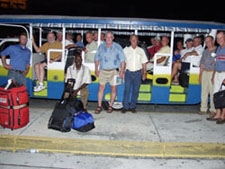 One of these steps has been to position the sport as kind and gentle. The promotion of an observer program at tournaments accomplishes this feat by allowing fish to be released, yet enables anglers and crews to display their skills to the fullest. This mission is well underway as almost six hundred observers have been accredited in the IGFA Certified Observer Program.
One of these steps has been to position the sport as kind and gentle. The promotion of an observer program at tournaments accomplishes this feat by allowing fish to be released, yet enables anglers and crews to display their skills to the fullest. This mission is well underway as almost six hundred observers have been accredited in the IGFA Certified Observer Program.
Photo right - IGFA's Certified Observers arriving St. Thomas for ABMT "Boy Scout" Tournament.
 Another step has been to open the door for the public to learn more about the sport. Thus, in 2004 the Big Game Room at the Miami International Boat Show was created.
Another step has been to open the door for the public to learn more about the sport. Thus, in 2004 the Big Game Room at the Miami International Boat Show was created. 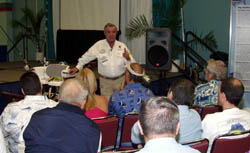 Thousands of visitors poured through this attraction last February and even more are expected in 2005 as the event evolves to an even more exciting level.
Thousands of visitors poured through this attraction last February and even more are expected in 2005 as the event evolves to an even more exciting level.
Photo right - Pioneer Capt. Ronnie Hamlin instructs fishermen on the proper use of circle hooks. The Big Game Room is the perfect venue for teaching and the sharing of ideas.
Yet a third step, Loveland has foreseen, is to provide the public with a way to view the sport. "They must feel included in our activities in order to become interested and involved themselves. To do this, we must share with them the excitement of tournament competition and teach them the intricacies of the sport. We feel the newly created Bermuda Triangle Series (BTS) is best positioned to bring the sport of Big Game Fishing to millions of television viewers."
THE BERMUDA TRIANGLE SERIES (BTS)
The BTS links a trio of tournaments in exotic fishing destinations such as the Bahamas in June, the " Grander- lurking" banks of Bermuda in July and the famous " Boy Scout" which is fished on the "North Drop" of the Virgin Islands in August.
Loveland says: "The BTS is designed so that everyone in the industry has a stake in it. We are testing the skills of the anglers and crews, along with the performance of the boats, the fishing tackle, the engines and the various navigation packages. This is a true Blue Water Challenge! Simultaneously, we have been putting together the players who will participate in the filming project."
As for the organization of the new event, Loveland explains: "The BTS is considered a 'team' event, yet individual legs are fished as 'angler' tournaments under modified release rules.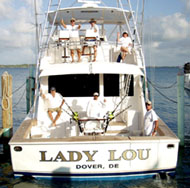 Rules-wise this means you can boat a potential IGFA World Rrecord and receive the same number of points as if it were released. If it weighs in short, the points are lost. Teams will earn points in the overall series, while angler points are the measure during the individual legs. To win the BTS Jackpot, at least two legs of the series must be fished and one must be the St. Thomas leg. There are no restrictions regarding the qualifications of an angler and team members may change during the various legs. IGFA Certified Observers are provided. Blue Marlin, White Marlin, Sailfish and Spearfish each count for points in the overall series."
Rules-wise this means you can boat a potential IGFA World Rrecord and receive the same number of points as if it were released. If it weighs in short, the points are lost. Teams will earn points in the overall series, while angler points are the measure during the individual legs. To win the BTS Jackpot, at least two legs of the series must be fished and one must be the St. Thomas leg. There are no restrictions regarding the qualifications of an angler and team members may change during the various legs. IGFA Certified Observers are provided. Blue Marlin, White Marlin, Sailfish and Spearfish each count for points in the overall series."
The inaugural series kicked-off with the Bahamas leg out of Harbour Island on June 16 to 18, 2004. Two boats - Jose Valdes' Lady Lou and Luis Bacardi's Rum Bum - made history by their participation. No billfish were released, yet no billfish were killed. "The fish won the tournament" stated Loveland.
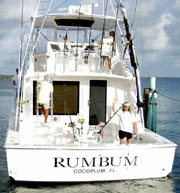 The anglers drew for a participation prize from Shimano and the observers had their chance at the 'Observer in the Hat' tackle prize, Loveland recaps. "Michael Leech of IGFA dispatched his gracious messenger Lynda Wilson with a congratulatory letter to the pioneering participants for their efforts in bringing the IGFA Certified Observer Program to the Bahamas." We were a bit humbled by the light turnout and the slow fishing, but it was a great experience and it reminded us of a time 32 years ago when we were struggling to get the 'Boy Scout' tournament off the ground."
The anglers drew for a participation prize from Shimano and the observers had their chance at the 'Observer in the Hat' tackle prize, Loveland recaps. "Michael Leech of IGFA dispatched his gracious messenger Lynda Wilson with a congratulatory letter to the pioneering participants for their efforts in bringing the IGFA Certified Observer Program to the Bahamas." We were a bit humbled by the light turnout and the slow fishing, but it was a great experience and it reminded us of a time 32 years ago when we were struggling to get the 'Boy Scout' tournament off the ground."
The BTS's second leg moved to Hamilton, Bermuda, July 16 to 18. There, two boats - Bacardi's Team Rum Bum and Italian angler Nicholas Pierini Team Somoya fishing aboard the chartered Challenger with the grander-famous Capt. Alan Card at the helm - battled it out on the seas. Rum Bum's mate and angler, Shawn Albury, released a marlin the first day.
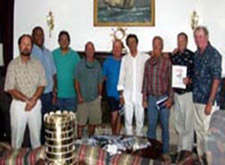 Albury describes the catch: "It wasn't a big fish, about a 150-pounder and the fight took about 10 minutes."
Albury describes the catch: "It wasn't a big fish, about a 150-pounder and the fight took about 10 minutes."
The second day, Pierini released his first marlin, which proved to be the last caught in the tournament.
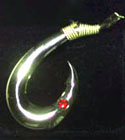 Albury thus earned "Top Angler" on time and a highly coveted hook-shaped gold pendent designed by marine artist Ed Pang.
Albury thus earned "Top Angler" on time and a highly coveted hook-shaped gold pendent designed by marine artist Ed Pang.
The 32nd year of the USVI Open/Atlantic Blue Marlin or "Boy Scout Tournament" was the final leg of inaugural BTS. There, Rum Bum, Lady Lou and Samoya went at it head to head and finally in the end Luis Bacardi of Team Rum Bum won the Ed Pang Gold Hook w/diamond for "Top Series Angler" BTS Leg #3 and the "Best Of Series" team plaque (BTS prepetual) went to Jose Valdes' Team Lady Lou.
Distinguished as the first team to ever compete in all three of the BTS tournaments (especially for traveling on their own bottom), Capt. Jim O'Neill, aboard Rum Bum, says: "The 'Boy Scout Tournament' is the hardest to win because of the way it's set up. With observers no one can cheat. You've got to really know what you're doing to win and the same is true with this new Bermuda Triangle Series."
THE FUTURE IS BRIGHT
Loveland says: "Just as with the IGFA Certified Observer Program and Big Game Room projects, the BTS is a 'from the bottom up' effort."
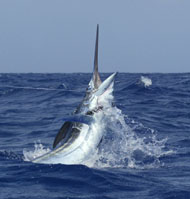 Reasons why Loveland and fellow organizers feel that they will attract sponsors and the attention of television producers and viewers are many. First, the Boy Scouts of America is the primary benefactor along with other youth programs on all three island destinations. Secondly, the Series will be filmed at three of the most exotic and productive fishing destinations in the world. Third, Series organizers bring with them over thirty years of tournament operating experience. Fourth and finally, there's a strong desire to tell the whole story about the sport of Big Game Fishing - especially to a public "hooked" on the new genera of reality programming.
Reasons why Loveland and fellow organizers feel that they will attract sponsors and the attention of television producers and viewers are many. First, the Boy Scouts of America is the primary benefactor along with other youth programs on all three island destinations. Secondly, the Series will be filmed at three of the most exotic and productive fishing destinations in the world. Third, Series organizers bring with them over thirty years of tournament operating experience. Fourth and finally, there's a strong desire to tell the whole story about the sport of Big Game Fishing - especially to a public "hooked" on the new genera of reality programming.
Loveland says: "Should we fail in making the bright lights of a documentary/reality fishing series, we guarantee that we will succeed in producing a world-class series of blue water tournaments!"
Photo right - Richard Gibson
